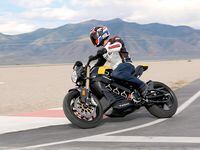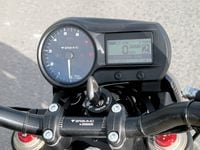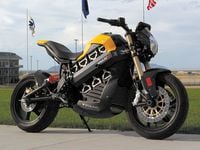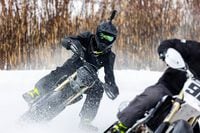Dropping a gear and diving into another corner, I could be on any number of fast, fun naked bikes. The Brammo Empulse handles great, accelerates hard, has strong brakes, and there's even a clutch and shift lever to manage. Except for the lack of noise and vibration, this all-electric bike feels remarkably conventional. In my mind, that's a high compliment.
So far, eBikes have been consigned to the ranks of commuter machines. Smooth, silent, and eco-friendly, but hardly exciting or engaging to ride. Brammo set out to change that perception with the Empulse, which debuted in 2013 with a six-speed transmission, wet multi-plate clutch, and water-cooling. The transmission—as well as the presence of a tachometer—restore the two key rider/bike interfaces I missed most on other eBikes.
Those technologies weren’t applied to make the Empulse feel more like a traditional gas-burning machine but as a means to an end. “We wanted performance that would impress a typical motorcyclist,” explains Brian Wismann, Brammo’s director of product development. That means a gearbox, since direct-drive setups will give you strong acceleration or a high top speed but not both. To handle sustained high output, water-cooling was a must.
For 2014, Brammo enacted a number of small changes aimed at improving the Empulse’s handling and performance. A new motor winding boosts horsepower and broadens the torque spread, while updated controller settings and transmission revisions improve throttle response and reduce driveline lash. A new tapered-aluminum handlebar replaces the previous 7/8-inch steel piece and moves the grips up and back about an inch. Careful scrutiny and the subsequent redesign of various brackets and hardware cut 10 pounds from the bike’s chassis, for a claimed curb weight of 460 pounds.
I got the chance to ride the new up-spec Empulse R—which has fully adjustable suspension, a more powerful motor, and various carbon-fiber bodywork panels—on the roads surrounding Miller Motorsports Park in Tooele, Utah, during a race weekend where Brammo was competing as part of its ongoing R&D efforts (see "Charging Forward" here).
The Empulse is compact and narrow between your knees and thighs but wide between your ankles where the swingarm pivot, motor, and transmission compete for space. The rider triangle is comfortable and feels familiar. No wonder, since Brammo modeled the Empulse’s ergonomics after Triumph’s lithe little Street Triple. The view from the cockpit is appealing, with the anodized caps of the Marzocchi fork projecting through the top triple clamp and rich carbon fiber framing the headlight and covering the top of the “tank.” The Empulse R has a distinctly premium look and feel, which is good considering it has a premium price of $18,995, $2,000 more than the base bike.
You start the bike using the familiar process of turning the key, flipping the kill switch, and pressing the starter button, at which point a series of LEDs atop the dash let you know the bike is live. From there you click down twice to get to first (neutral is between second and third) and let out the hydraulically actuated clutch, or simply click it into any gear and twist the throttle—with no idle there’s no need to use the clutch. The Empulse makes a claimed 60.5 pound-feet of torque from the word go, so you can easily launch from second or third—or even fifth, as I did accidentally after rolling to a stop in town.
The Empulse offers two drive modes, Normal and Sport, selected via the starter switch with the bike stopped and in neutral. Normal is gentle, delivering very soft throttle response. Sport, on the other hand, is pretty compelling. Pin the throttle in first and you’re rewarded with seriously impressive acceleration. And in sixth, Brammo says the Empulse tops out at 110 mph. This bike is definitely not just another plug-in commuter.
The clutch has a light pull, and you can hear everything that’s spinning and meshing down in the gearbox since there’s no sound of combustion to mask it. The gearbox shifts well, though there’s quite a bit of driveline lash. It’s most noticeable when getting started from a stop, but if you roll the bike backward a few inches to preload the cogs, the ensuing start is seamless.
Power is stout and flat up through 6,000 rpm, and while the motor pulls all the way to and beyond the 8,000 redline, you can feel that torque tails off. The new motor winding bumps horsepower from a claimed 54 to 60 hp at 5,500 rpm. That’s about as much horsepower as Kawasaki and Suzuki’s 650cc twins, but torque is significantly stronger on the Brammo.
The Empulse is Brammo’s take on a naked sportbike, so the ability to slice up a twisty back road was high on the list of objectives. I tracked down some challenging pavement in the hills south of Miller and was surprised by how much fun the Brammo was to weave through corners.
Handling is excellent, due in no small part to the fact that the bike’s geometry and suspension settings were developed by AMA Supersport and Formula Extreme champion Eric Bostom, who has worked as a development rider for Brammo since 2012. The fork and shock are sportbike firm but responsive enough to smooth out frost-heaved pavement. Regenerative braking mimics engine braking entering corners, and the bike remains neutral while turning in on the brakes. Dual four-piston Brembo calipers and 310mm discs offer serious stopping power that’s borderline overkill for the street. A single disc would likely suffice.
Charging into corners is where the Empulse proves the most fun. Front-end feel is great, and while it’s not necessary to shed gears going into corners, it’s a blast! With so little flywheel inertia acting on the transmission it feels like it has a slipper clutch, so you can dump multiple gears at once and then rocket away from the apex. The bike’s heft only becomes evident when navigating a succession of tight turns; it takes some muscle and a fair amount of body language to get the bike transitioned.
I was having a hoot on the Empulse and was genuinely impressed by its handling and performance, but my ham-fisted antics and the steep terrain drained the batteries quickly. I lost about 20 percent charge in just a few miles of fun, and by the time I turned around to head back to the track, it was clear I wasn’t going to have enough juice to make it back. The Empulse rolled to a stop 10 miles from Miller, with just 50 miles on the tripmeter.
“With electric vehicles, rule number one is, ‘Know your environment,’” says Wismann, who sent a truck out to retrieve the bike and me from the side of the road. When I hopped on the Empulse in the paddock at Miller, Wismann suggested a range of 70 miles, which is a figure he says is attainable with mixed urban/highway conditions. “In hindsight,” Wismann says, considering the high local speed limit and hilly terrain, “I should have given you the 70 mph ‘highway’ driving range, which is 56 miles.”
Lesson learned, but the experience highlighted the single biggest issue with eBikes: range. While the Brammo nearly achieves parity with bikes like the Kawasaki Ninja 650 and Suzuki SFV650 in terms of performance, it can’t travel nearly as far on a “tankful” and can’t be filled up in a few minutes at a gas station. In terms of pure energy, the Brammo’s 9.3 kWh battery pack is no match for a few gallons of fuel.
The Empulse’s batteries need eight hours to achieve a full charge when using a 120-volt household plug, but if you have a Level 2 charging station available (there are more than 7,000 public stations nationwide) you can achieve a quicker charge using the Empulse’s integrated onboard charger. Specifically, a battery pack at 20 percent charge can be brought to 80 percent in two hours and to a full charge in 3.5 hours.
Range limitations aside, the Empulse R is a competent electric sportbike. It’s got the performance to put a smile on any rider’s face, even if you’re a veteran. And for beginners, the ride modes and “optional” clutch means riders can grow into the bike and learn to use the lever at their own pace, with no risk of stalling. There’s a lot to like about the Empulse, and if you don’t need to go too far, it might be the bike for you.
















/cloudfront-us-east-1.images.arcpublishing.com/octane/VZZXJQ6U3FESFPZCBVXKFSUG4A.jpg)
/cloudfront-us-east-1.images.arcpublishing.com/octane/QCZEPHQAMRHZPLHTDJBIJVWL3M.jpg)
/cloudfront-us-east-1.images.arcpublishing.com/octane/HXOUJXQWA5HBHGRO3EMJIGFMVI.jpg)

/cloudfront-us-east-1.images.arcpublishing.com/octane/3TIWWRV4JBBOLDVGRYECVVTA7Y.jpg)
/cloudfront-us-east-1.images.arcpublishing.com/octane/KIX5O23D5NAIBGFXBN3327DKZU.jpg)
/cloudfront-us-east-1.images.arcpublishing.com/octane/7GJYDUIPXRGMTMQKN6ONYOLBOU.jpg)
/cloudfront-us-east-1.images.arcpublishing.com/octane/MUQLOVLL2ZDGFH25ILABNBXKTI.jpg)
/cloudfront-us-east-1.images.arcpublishing.com/octane/TNOU5DNE2BC57MFPMGN2EIDXAM.jpg)
/cloudfront-us-east-1.images.arcpublishing.com/octane/GTCXACQGJ5HAPDTGWUQKDEH44E.jpg)
/cloudfront-us-east-1.images.arcpublishing.com/octane/S35YGSEMEZB4BLTDJTSZPF4GLA.jpg)
/cloudfront-us-east-1.images.arcpublishing.com/octane/5UOT6HPX2JFMRJAX6EH45AR4MQ.jpg)
/cloudfront-us-east-1.images.arcpublishing.com/octane/OKWOJWAKP5EP3OACCRRWPCIX2Q.jpg)
/cloudfront-us-east-1.images.arcpublishing.com/octane/2WF3SCE3NFBQXLDNJM7KMXA45E.jpg)
/cloudfront-us-east-1.images.arcpublishing.com/octane/G4MG6OUCJNBSHIS2MVVOTPX65E.jpg)
/cloudfront-us-east-1.images.arcpublishing.com/octane/IIGGWFOTOJGB7DB6DGBXCCMTDY.jpg)
/cloudfront-us-east-1.images.arcpublishing.com/octane/QSTCM6AVEZA5JJBUXNIQ3DSOF4.jpg)
/cloudfront-us-east-1.images.arcpublishing.com/octane/U4I7G625B5DMLF2DVIJDFZVV6M.jpg)
/cloudfront-us-east-1.images.arcpublishing.com/octane/B6XD6LS6IVCQPIU6HXDJSM3FHY.jpg)
/cloudfront-us-east-1.images.arcpublishing.com/octane/ICL63FEDDRDTTMINYICCEYGMDA.jpg)
/cloudfront-us-east-1.images.arcpublishing.com/octane/FCGZHQXRBZFLBAPC5SDIQLVF4I.jpg)
/cloudfront-us-east-1.images.arcpublishing.com/octane/WNOB6LDOIFFHJKPSVIWDYUGOPM.jpg)

/cloudfront-us-east-1.images.arcpublishing.com/octane/X33NU3E525ECRHXLNUJN2FTRKI.jpg)